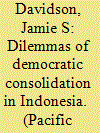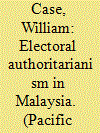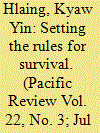|
|
|
Sort Order |
|
|
|
Items / Page
|
|
|
|
|
|
|
| Srl | Item |
| 1 |
ID:
089923


|
|
|
|
|
| Publication |
2009.
|
| Summary/Abstract |
This article grapples with the tricky issue of democratic consolidation in post-Soeharto Indonesia. It recognizes the great strides the country has made toward establishing a rights-based democracy. This includes attempts to tackle the legacies of decades-long authoritarianism - for instance, those times when state elites have put self-interestedness aside to cooperate in the establishment of new institutions that promote genuine democratization. This article argues, however, that democratic consolidation in Indonesia will continue to be bedeviled due to the poor institutionalization of a democratic rule of law. Until state elites and government officials predictably can be relied upon to enforce democratic institutions, and are subject to the law themselves, then a meaningful deepening of Indonesia's elitist/electoral democracy will be unobtainable.
|
|
|
|
|
|
|
|
|
|
|
|
|
|
|
|
| 2 |
ID:
089924


|
|
|
|
|
| Publication |
2009.
|
| Summary/Abstract |
This paper proposes an analytical framework by which to understand the origins, functioning, and dynamics of electoral authoritarianism in Malaysia. It thus explores notions of historical legacies, structural pressures, critical junctures, and institutional formation. But in guarding against teleology, it also considers elite agency and 'stunning elections'. This framework is applied in the case of Malaysia because, in anticipating contemporary trends, the country has so long perpetuated a paradigmatic electoral authoritarian regime. And yet, with many countries growing similarly authoritarian today, Malaysia has suddenly become less so, with the government having been dealt a startling setback in its latest contest, held in March 2008, thus losing its extraordinary majority in parliament and control over five states. Hence, if democratization once again gains steam round the world, Malaysia may presage this trend too, with its electoral authoritarianism, long so resilient, perhaps poised today on the edge of transition.
|
|
|
|
|
|
|
|
|
|
|
|
|
|
|
|
| 3 |
ID:
089926


|
|
|
|
|
| Publication |
2009.
|
| Summary/Abstract |
By examining different Thai regime forms over the last 30 years this paper attempts to show how an uneasy co-existence between liberal and authoritarian forces has impacted on the exercise of power and regime form. Arguing that the persistence of authoritarian power in the military and the monarchy is central to understanding the nature of Thailand's ambivalent state, it moves to a contemporary analysis of 'decisionist politics'.
|
|
|
|
|
|
|
|
|
|
|
|
|
|
|
|
| 4 |
ID:
089921


|
|
|
|
|
| Publication |
2009.
|
| Summary/Abstract |
In keeping with much analysis of Southeast Asian politics today, the papers in this special issue argue that it is less fruitful to study democratic transitions than authoritarian durability. At the turn of the 21st century, Southeast Asia featured three new democracies. But only Indonesia is still rated by Freedom House as 'politically free'. Yet even here, the legislators and party leaders who have been thrust up by democratic change sooner engage with top bureaucrats and business tycoons in pursuit of largesse than produce public goods. In the Philippines, corrupt practices and human rights violations have grown so severe that the country lost its rating of 'free' in 2007. And Thailand's democracy was disfigured by executive abuses, then overturned through a military coup. This issue investigates, then, the new authoritarian practices that mar regimes in Indonesia, the Philippines, and Thailand, as well as older forms that have persisted or been reconstituted in Malaysia, Vietnam, and Burma. Where these papers differ from much recent scholarship, however, is in their extending study from historical and structural factors to elite-level voluntarism and relations.
|
|
|
|
|
|
|
|
|
|
|
|
|
|
|
|
| 5 |
ID:
089925


|
|
|
|
|
| Publication |
2009.
|
| Summary/Abstract |
Over the past decade, and especially over the past few years, political corruption, fraud and violence in the Philippines have reached such alarming levels that many Filipinos have grown despondent, even cynical, about their country's political system. Exploring the suitability of the concepts of 'predatory state' and 'patrimonial oligarchic state' to the Philippines, I find that the regime rather than the state is the more appropriate unit of analysis. I argue that the predatory regime, controlled by a rapacious elite, that held sway during the years of the dictator Marcos, has made a comeback in the Philippines. Under the governments of President Joseph Estrada and Gloria Macapagal Arroyo, traditional clientelism has given way to pervasive corruption, a systematic plunder of government resources and the rapid corrosion of public institutions into tools for predation. Instead of just being a throwback to the 'old corruption' of the Marcos era, however, the current predatory regime represents a 'new corruption' adapted to the ways of economic and political liberalization. While not as authoritarian as Marcos' regime, it has growing authoritarian tendencies: centralization of power in the executive; heightened repression; rigged elections; a much weakened rule of law; numerous political appointees in the bureaucracy; and increased influence of the military. A shift to naked authoritarianism, however, cannot be ruled out. As forces for democratic reform are much too weak, the predatory regime may be around for some time or it could give way, at best, to a more traditional clientelist electoral regime. Prospects for democratic consolidation in the Philippines in the near future appear bleak.
|
|
|
|
|
|
|
|
|
|
|
|
|
|
|
|
| 6 |
ID:
089922


|
|
|
|
|
| Publication |
2009.
|
| Summary/Abstract |
Regardless of its growing unpopularity, the ruling military junta in Burma remains far stronger than any of its foes in the country. This article probes how the junta managed to remain in power for such a long time. The answer lies in the informal procedures that governed the way leading members of the junta dealt with their differences and disagreements with their colleagues. Deriving from the rules of engagement within the military established by former military dictator Ne Win, two features came to epitomize the organizational culture of the Tatmadaw (armed forces). The first of these is the maintenance of incriminating evidence against senior members of the military in the event that they fall out of favour or need to be disciplined. The second feature of this culture that has now taken root is the observance of discrete domains of operation. This latter feature allows for the dissipation of tension between officers who are unable to get along well with each other. Importantly, it also prevents a senior officer from acquiring sufficient power to challenge more senior officers within the Tatmadaw hierarchy. Once certain rules became established norms of the Tatmadaw, they came to influence the actions and strategies taken by military officers. The rules that governed the ways military officers interacted with the colleagues they did not get along with and the incentives the Tatmadaw as an organization has created for its members have kept it together. Therefore, regardless of external and internal pressures, the army remains the most organized institution in Burma and appears to be more unified now than ever before.
|
|
|
|
|
|
|
|
|
|
|
|
|
|
|
|
| 7 |
ID:
089927


|
|
|
|
|
| Publication |
2009.
|
| Summary/Abstract |
Authoritarian states are states in which dominant parties discourage or disallow organized political competition. By such a definition, Viet Nam under the Communist Party of Viet Nam (CPV) has been consistently authoritarian. But an authoritarianism of what sort? The CPV's rule in the north (since the 1940s) and on a country-wide basis (since 1975) has been punctuated by major wars, the rise and demise of state-socialist institutions, hostile international blockades, protracted economic malaise and, most recently, the development of a market-Leninist regime in which markets and trade have propelled growth and improved living standards within the framework of democratic centralism. An historical sketch of authoritarianism under the CPV can shed light on significant changes in the forms and substance of authoritarianism in Viet Nam.
|
|
|
|
|
|
|
|
|
|
|
|
|
|
|
|
|
|
|
|
|